
Convicted murderer Earl J. Clark was granted a stay of execution today as his appeal twisted its way through the State Supreme Court. There was a time when Clark’s chances to avoid the gallows seemed promising; however, following an escape from prison, things were looking grim.
It all began in April of 1925 when Clark, a handsome, half-Cherokee bootlegger, stabbed Charles Silva, a Filipino sailor, in a dispute over a girl. The girl in question was 17-year-old Mamie Stephens, herself a fugitive from justice since her escape from a girls’ reformatory the previous October. Though accounts varied, when the three met at Clark’s home, Stephens apparently wore a red rose in her hair as a sign to Silva that she would leave Clark for him. Tempers flared, and Clark refused to let Stephens leave the house. When Silva stepped in to help her, a fight broke out, during which Clark stabbed Silva in the gut. Silva apparently did not realize the severity of his wounds, and died later that night en route to his ship. The papers dubbed the case "the Red Rose Murder" and Stephens "the Red Rose Girl."
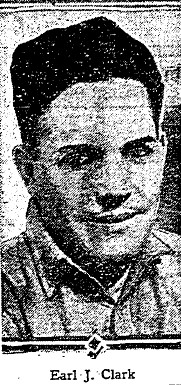 In July of 1925, Clark was sentenced to hang, but his attorneys immediately initiated an appeal to save his life. The appeal before the State Supreme Court was repeatedly delayed while Clark languished in the Los Angeles County Jail. On March 16, 1926, just days before his appeal was scheduled to come before the court, Clark and five others escaped from jail. While the five were quickly captured, Clark managed to go into hiding for over nine months. He was finally found in Minot, North Dakota, the proprietor of a paint store across the street from the local police station and husband to the daughter of one of Minot’s leading citizens.
In July of 1925, Clark was sentenced to hang, but his attorneys immediately initiated an appeal to save his life. The appeal before the State Supreme Court was repeatedly delayed while Clark languished in the Los Angeles County Jail. On March 16, 1926, just days before his appeal was scheduled to come before the court, Clark and five others escaped from jail. While the five were quickly captured, Clark managed to go into hiding for over nine months. He was finally found in Minot, North Dakota, the proprietor of a paint store across the street from the local police station and husband to the daughter of one of Minot’s leading citizens.
Following his extradition to California, Clark was resentenced to death; however, his attorneys had the appeals process reinstated. However, it was all for naught. Clark’s appeal failed, and his hanging was set to be carried out September 23, 1927.
Helen Scofield Clark, Clark’s 19-year-old wife, wept openly upon hearing Clark’s fate, saying, "I’ll never believe he is guilty." However, she was not present for the judgment, having been forbidden by her parents to travel to California for the trial.
Clark was set to be hung alongside Joseph Sandoval, a Ventura man who had murdered his wife in a drunken stupor, but Sandoval’s sentence was commuted by Governor Young the night before the execution. Clark received no such clemency. On the gallows at San Quentin, he cursed the crowd of about 100 spectators who had gathered to watch the hanging, and as the black hood was placed over his head, whispered to his executioners, "Make it snappy."
Los Angeles police officers took up a collection for Clark’s widow so she could have the body shipped to Minot for burial. She accepted the money, but not Clark’s remains. No one else claimed them either, and he was subsequently buried in the prison cemetery.

 Convicted murderer Earl J. Clark was granted a stay of execution today as his appeal twisted its way through the State Supreme Court. There was a time when Clark’s chances to avoid the gallows seemed promising; however, following an escape from prison, things were looking grim.
Convicted murderer Earl J. Clark was granted a stay of execution today as his appeal twisted its way through the State Supreme Court. There was a time when Clark’s chances to avoid the gallows seemed promising; however, following an escape from prison, things were looking grim.
 In July of 1925, Clark was sentenced to hang, but his attorneys immediately initiated an appeal to save his life. The appeal before the State Supreme Court was repeatedly delayed while Clark languished in the Los Angeles County Jail. On March 16, 1926, just days before his appeal was scheduled to come before the court, Clark and five others escaped from jail. While the five were quickly captured, Clark managed to go into hiding for over nine months. He was finally found in Minot, North Dakota, the proprietor of a paint store across the street from the local police station and husband to the daughter of one of Minot’s leading citizens.
In July of 1925, Clark was sentenced to hang, but his attorneys immediately initiated an appeal to save his life. The appeal before the State Supreme Court was repeatedly delayed while Clark languished in the Los Angeles County Jail. On March 16, 1926, just days before his appeal was scheduled to come before the court, Clark and five others escaped from jail. While the five were quickly captured, Clark managed to go into hiding for over nine months. He was finally found in Minot, North Dakota, the proprietor of a paint store across the street from the local police station and husband to the daughter of one of Minot’s leading citizens. 



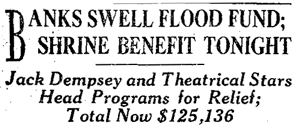


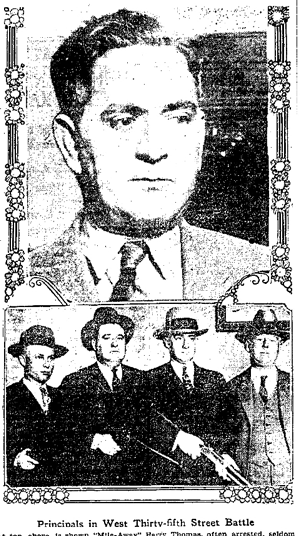 Officers responded to her call about a prowler, and when they arrived, acclaimed hijacker Thomas went for his piece. The cops opened up with a machine gun, a sawed-off shotgun and two large-caliber revolvers, and yet the twice-arrested-for-murder, “King of the Hi-Jackers” Mile-Away Thomas, filled with pounds of buckshot and slugs, ran from the garage straight at the cops.
Officers responded to her call about a prowler, and when they arrived, acclaimed hijacker Thomas went for his piece. The cops opened up with a machine gun, a sawed-off shotgun and two large-caliber revolvers, and yet the twice-arrested-for-murder, “King of the Hi-Jackers” Mile-Away Thomas, filled with pounds of buckshot and slugs, ran from the garage straight at the cops. 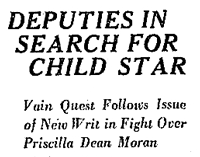
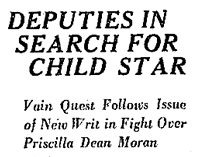 April 29, 1927
April 29, 1927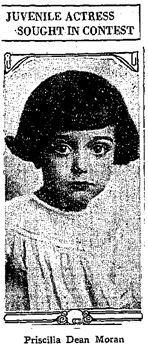 And why is this sundry so all-fire interested in Priscilla? Because the eight year-old lass is a juvenile star, and the small waif with large paycheck has been actively engaged in film work for some time, her last picture selling for 100k (1,180,180 USD2005).
And why is this sundry so all-fire interested in Priscilla? Because the eight year-old lass is a juvenile star, and the small waif with large paycheck has been actively engaged in film work for some time, her last picture selling for 100k (1,180,180 USD2005).